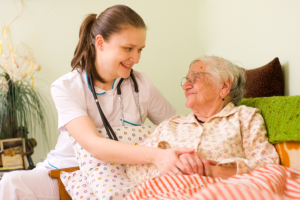
An ACSAH Certified Senior Care Aide® (CSCA) is a trained health care provider who works in private homes and residential facilities to care for people who need assistance with their daily living. Such people typically are individuals who are elderly or have some sort of physical or mental disability, illness or are recovering from injury or surgery.
ACSAH Certified Senior Care Aides® (CSCA) are now a vital part of the broader health care system and their area of influence in an individual’s life is no longer confined to personal tasks such as bathing and dressing etc. but also includes assisting with instrumental activities of daily living (IADL) such as cooking, laundry etc.
Appropriate CSCA training is critical for the success of the services delivered and the overall success of the health care system. CSCA certifications must be renewed every two years. Certifications not renewed within 4 years of issuance will be required to re-take the CSCA certification exam. The CSCA exam consists of 100 multiple choice questions and there is a time limit of two hours to complete the exam online. A score of 75% is required to pass the exam. The exam may be taken multiple times.
Click here to download the Certified Senior Care Aide® (CSCA) application form.
The CSCA exam focuses on the following topics:
- Roles and responsibilities of a personal care attendant
- Caring for the elderly and disabled
- Communication skills
- Moving and positioning someone in bed and in/out a wheelchair
- Active range of motion exercises
- How to recognize and prevent pressure ulcers
- Proper body mechanics for the caregiver and care recipient
- Infection control and blood borne pathogens
- Personal care (grooming, hygiene, etc)
- Tub baths and showers
- Assisting with medications
- Safe wheelchair use
- Nutrition
- Reducing personal stress
- Fall prevention
- Fire safety
- Elder abuse and neglect
- Cultural competency
- Specific diseases, including: early to mid and mid to late stage Alzheimer’s disease, arthritis, diabetes, cardiovascular disease, stroke and aphasia, depression, Parkinson’s, ALS, multiple sclerosis, spinal cord injury
